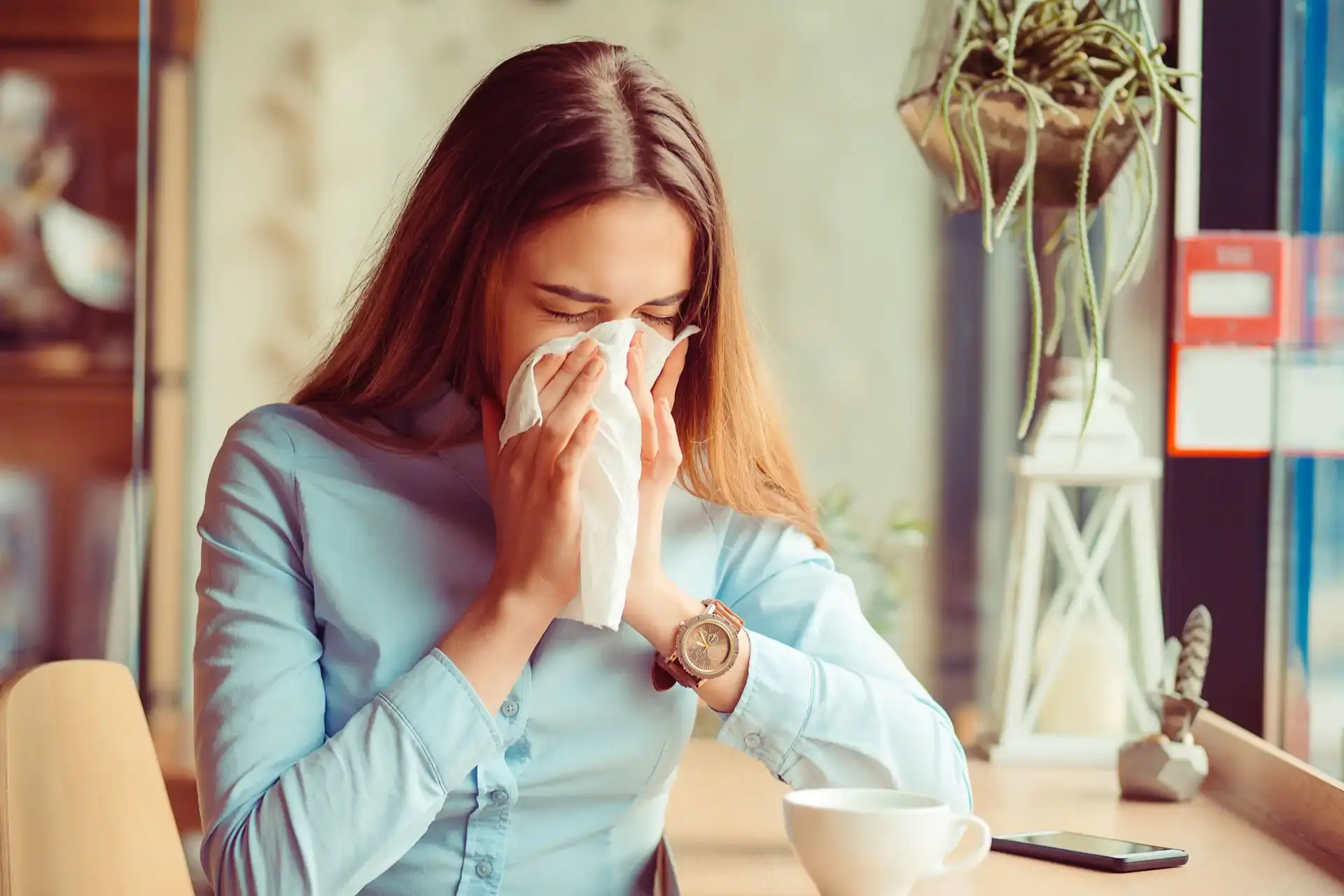Why Are Allergies Worse at Night?
If your allergy symptoms are worse at night, you know firsthand that trying to get enough rest can be frustrating. Symptoms like nasal congestion can obstruct breathing and make it difficult to fall asleep and stay asleep.
So if your symptoms seem worse at night and are keeping you awake, you may wonder why. The answer might be allergens in your bedding. For example, dust mites are tiny creatures some people are allergic to, and they thrive in pillows and bedding.
Pet dander on your bed might be another reason. If your furry friends spend time on your bed, pet dander can stick to your blankets and sheets, causing allergy symptoms when it’s time to sleep.
Even though pollen is an outdoor allergen, it can easily stick to your clothes, skin, and hair—or come into your bedroom through open windows—and cause you to have allergy symptoms.
Allergies and Sleep Apnea
Sleep apnea is a sleep disorder in which breathing repeatedly stops and starts while you are asleep at night. It can disrupt your sleep and lead to serious health issues. If you have difficulty breathing through your nose because of allergies, you are more likely to have repeated obstructions and extended pauses in breath if you have sleep apnea. 2,3
Symptoms of sleep apnea include:
Loud snoring
Episodes in which you stop breathing during sleep
Gasping for air during sleep
Waking up with a dry mouth
Headaches in the morning
Difficulty staying asleep
Extreme daytime sleepiness
Difficulty paying attention while awake
Sleep apnea is a serious medical condition and can lead to complications such as daytime fatigue and increased risk of heart disease and diabetes.2 If you think you have sleep apnea, talk to your doctor.
Night Time Allergy Symptoms
Allergy symptoms are annoying any time of day. But especially at night when you’re trying to sleep, all the sniffling and nose-blowing can be aggravating.
Here are some common allergy symptoms that might be worse for some people at night:
Nasal congestion
Runny nose
Coughing
Sneezing
Itchy, watery eyes
Itchy or sore throat
Itchy nose
Allergy Relief Tips for Better Sleep
Nighttime is no time for allergy symptoms. Here are some tips to help relieve your allergies at night.
Keep Your Head Elevated To Fight Congestion
You may get a better night’s sleep by using extra pillows to keep your head above your body. Keeping your head elevated with extra pillows can help reduce nasal congestion and allow secretions to drain. Even raising your head just a few inches can make a difference for a good night’s rest.
For more tips to fight congestion, visit our guide.
Wash Bedding in Hot Water To Get Rid of Allergens
You might not realize it, but your bedding may be full of allergy triggers you can’t see. Allergy-causing dust mites thrive in pillows, blankets, quilts, comforters, plush toys, and mattresses.
To minimize allergen particles such as dust, pollen, and pet dander, wash bedding in hot water and dry it in a hot dryer once a week. Don’t dry sheets outside, because they can trap pollen.
Eliminate extra pillows and fabrics, and replace old pillows and bedding. Consider using pillow and mattress covers designed to protect against allergies.
Keep Pets Off the Bed to Minimize Dander
As much as we love to snuggle up with our furry companions in bed, it could be pet dander that is making nighttime allergies worse. Pet dander is one of the most common causes of indoor allergies.
Keep your pets out of your bedroom, and especially off of your bed, to help reduce the amount of pet dander in your bedroom. You also want to make sure that during the day, your pets aren’t sneaking into your empty bed to find a cozy spot to nap. Consider using pet gates or keeping bedroom doors closed to reduce pet allergens on your bed.
Learn more about pet allergy tips by visiting our guide.
Eliminate Cockroaches
The thought of cockroaches in your home while you sleep at night may be disturbing—but it turns out that these pests might be causing your allergies at night. If so, you aren’t alone—according to information from the American College of Asthma, Allergy, and Immunology, 63% of homes in the United States contain cockroach allergens. In urban areas, that number rises to between 78% and 98% of homes.4
Cockroaches love messes, so keep your home clean to avoid giving them places to thrive. Help eliminate cockroaches by keeping food and garbage containers sealed and avoiding piles of newspapers, laundry, magazines, or dirty dishes. If you think you have cockroaches in your home, call an exterminator.
Close the Windows and Filter Your Air
Air quality can make a difference in reducing allergy symptoms at night.
Pollen is a powdery outdoor allergy trigger that can easily make its way indoors. To reduce the amount of pollen on your bedding, bathe, wash your hair, and change clothing after being outdoors and before getting into bed. Take off your shoes before you go into the bedroom to help reduce the pollen and other allergens you track in from the outdoors.
Humidity can be another culprit for indoor air quality because humid environments can lead to mold, a common allergy trigger. To reduce mold indoors, use a dehumidifier and remove sources of dampness in your home, such as leaks.
You may enjoy a fresh breeze at night, but to improve your indoor air quality and reduce allergies at night, its best to keep your windows closed. If it gets warm, use an air-conditioner with a HEPA filter.
To learn more about reducing indoor allergies, visit our guide.
Take an Antihistamine
Taking an antihistamine before bed, especially one with a decongestant if experiencing congestion, can help relieve the allergy symptoms that keep you up at night. For fast-acting relief from sinus pressure and nasal congestion caused by allergies, consider an antihistamine and decongestant like BENADRYL® Allergy Plus Congestion for Sinus Pressure & Nasal Congestion Relief. Made with 25 mg of diphenhydramine and 10 mg of phenylephrine, these allergy relief tablets provide effective relief from symptoms such as:
Sneezing
Itchy, watery eyes
Runny nose
Itchy throat
Sinus congestion
Sinus pressure
For adults and children 12 years and older, take 1 BENADRYL® Allergy Plus Congestion tablet every 4 hours.
References
Cleveland Clinic. Here’s What Happens When You Don’t Get Enough Sleep (and How Much You Really Need a Night). March 25, 2022. Accessed from: https://health.clevelandclinic.org/happens-body-dont-get-enough-sleep/
Mayo Clinic. Sleep Apnea. July 28, 2020. Accessed from: https://www.mayoclinic.org/diseases-conditions/sleep-apnea/symptoms-causes/syc-20377631
Chirakalwasan N, Ruxrungtham K. The Linkage of Allergic Rhinitis and Obstructive Sleep Apnea. Asian Pacific Journal of Allergy and Immunology. 2014 Dec;32(4):276-86. https://pubmed.ncbi.nlm.nih.gov/25543037/
American College of Allergy, Asthma, and Immunology. Cockroach Allergy. February 1, 2018. Accessed from: https://acaai.org/allergies/allergic-conditions/cockroach-allergy/


